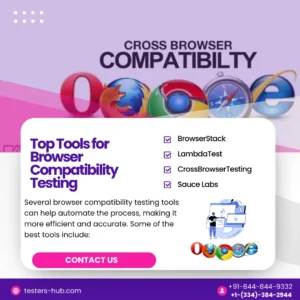Cross-browser compatibility testing is essential in today’s digital world to ensure your website functions smoothly across various browsers. It helps verify that your site works properly on popular browsers like Chrome, Firefox, Safari, and Edge. Using browser compatibility testing tools and cross-browser compatibility testing tools, you can easily check browser compatibility and perform a website browser compatibility test. These tools help identify issues, ensuring a cross-browser compatible website and a consistent user experience. Automated and open-source tools make testing more efficient, enabling you to test website cross-browser compatibility with ease.
Importance of Browser Compatibility Testing for Website Success
Why Browser Compatibility Testing Is Crucial for Your Website
As more users access websites through different browsers, it’s crucial to make sure your site functions well on all of them. Browser compatibility testing is essential to provide a consistent experience, whether users are on Chrome, Firefox, Safari, or Edge. By utilizing browser compatibility testing tools, you can ensure your site operates smoothly across various platforms. If your site doesn’t work well with certain browsers, it can result in a frustrating experience for users, increased bounce rates, and potential revenue loss. Performing a browser compatibility test and employing cross-browser compatibility testing tools is vital to identify and resolve these issues. Ensuring your site is compatible across browsers is important for maintaining user engagement and enhancing overall website performance.
How to Conduct Browser Compatibility Testing for Your Site
There are several approaches to browser compatibility testing. Automated tests using browser compatibility testing tools can help identify and fix issues across browsers quickly. However, manual testing is also essential, particularly for detecting design inconsistencies that may be missed by automation.
Common Issues in Browser Compatibility and How to Fix Them
Some of the most common browser compatibility issues include:
- CSS Rendering: Different browsers interpret CSS differently, leading to styling issues. Using tools like cross-browser compatibility testing tools can help ensure your CSS works across all platforms.
- JavaScript Compatibility: Ensure that JavaScript functions properly in all browsers. Consider using web application testing services to catch and fix issues.
- Responsive Design: Sometimes, websites do not look good or work well on different screen sizes. You can use a responsive design checker to ensure that your website is fully responsive.
Top Tools for Browser Compatibility Testing
Best Browser Compatibility Testing Tools to Use
Several browser compatibility testing tools can help automate the process, making it more efficient and accurate. Some of the best tools include:
- BrowserStack: A popular tool for testing websites on different devices and browsers.
- LambdaTest: A cross-browser compatibility tool that also supports Selenium for automated testing.
- CrossBrowserTesting: Provides a cloud-based testing environment for websites and mobile applications.
- Sauce Labs: Allows you to test your site across various devices, operating systems, and browsers.
Automated Browser Compatibility Testing Tools
Automated testing tools significantly speed up the process of testing your site across multiple browsers. They run tests automatically and give you instant feedback on compatibility issues. Tools like Selenium, Cypress, and TestComplete are ideal for automated web testing.
Open Source Browser Compatibility Testing Tools for Web Developers
Open-source tools are great for developers looking to save on costs. Tools like Sikuli, Nightwatch.js, and WebdriverIO provide an open-source alternative to premium browser compatibility tools. These tools can automate cross-browser testing tasks, ensuring your website works on all major browsers.
How to Check Browser Compatibility for Your Website
How to Check Website Browser Compatibility Across Different Browsers
Checking your Web compatibility testing is straightforward with the right tools. Use a browser compatibility testing tool like LambdaTest or BrowserStack to perform tests across different browsers and devices. These tools simulate real user experiences and provide detailed reports on compatibility.
How to Perform a Website Browser Compatibility Test Online
There are many online platforms that allow you to test your website’s compatibility with various browsers. Tools like TestComplete, BrowserStack, and CrossBrowserTesting provide cloud-based testing environments, enabling you to test your site without installing additional software.
Testing Your Website for Cross-Browser Compatibility Online
Consider utilizing cross-browser compatibility testing tools to ensure that your website functions and looks good across all browsers. All of the main online browsers, including Internet Explorer, Chrome, Firefox, Safari, and Edge, can be used to test your website.
Web Testing Services: Ensuring Your Website Works Across All Browsers
Website Testing Services: Why You Need Professional Help
While automated testing tools are efficient, sometimes professional website testing services are necessary to ensure that all aspects of your site are thoroughly tested. Website testing companies offer services that cover all aspects of web testing, from browser compatibility testing to usability testing and performance testing.
How Website Testing Companies Ensure Cross-Browser Compatibility
Professional website testing services include manual and automated testing for cross-browser compatibility. These services typically involve checking your website on multiple browsers and devices to identify issues like broken layouts, missing content, and JavaScript errors. They also provide solutions and recommendations for fixing the identified issues.
Choosing the Right Web Testing Service for Your Business
When selecting a web testing service, consider companies that specialize in Web compatibility testing, usability testing, and automated cross-browser compatibility testing. Reputable testing services will provide a comprehensive report with detailed findings and action plans.
Cross-Browser Compatibility Testing: Key to Reaching All Users
What Is Cross-Browser Compatibility Testing?
Web compatibility testing ensures that your website or web application functions and displays correctly across all popular browsers. This process tests for consistent layout, content presentation, and functionality, regardless of which browser or version the user is using.
How Cross-Browser Compatibility Testing Enhances User Experience
Ensuring your site works on different browsers improves user experience testing. When users can access and interact with your website without encountering errors or layout issues, they are more likely to stay on your site longer and convert into customers.
Testing Your Website for Cross-Browser Compatibility Online
To verify that your website works across a variety of browsers, use cross-browser compatibility tools like Sauce Labs or BrowserStack. With the use of these tools, you can replicate the user experience across various browsers and devices, guaranteeing a seamless and easy experience.
The Role of Web Usability Testing in Website Success
Understanding Web Usability Testing and Its Importance
Web usability testing is essential for ensuring that users can easily navigate your website. Conducting regular usability tests helps identify problems that may cause users to abandon your site, such as confusing navigation or non-intuitive design elements.
How to Test Website Usability Across Different Browsers
Website usability testing should be conducted on different browsers and devices. Use responsive design checkers and automated cross-browser compatibility testing to make sure your website is easy to use, regardless of the platform.
Best Usability Testing Sites for Web Developers
Several platforms offer usability testing services that help identify pain points in the user experience. UsabilityHub, Optimal Workshop, and Lookback are great resources for conducting usability testing on your site.
How to Test Website Compatibility with Different Browsers
Tools to Test Website Compatibility Across Browsers
To ensure your site is compatible with different browsers, use browser compatibility tools such as Web browser testing, BrowserStack, and LambdaTest. These tools simulate how your site will look and behave across a variety of browsers and devices, giving you peace of mind that your site is accessible to all users.
Test Website Usability and Compatibility in Multiple Browsers
Website testing sites like Sauce Labs and TestComplete allow for simultaneous cross-browser compatibility testing and website usability testing, ensuring that both functionality and user experience are optimized across all browsers.
Comprehensive Website Testing Sites for Cross-Browser Compatibility
If you want to test your website’s functionality and usability in various environments, consider using website testing services like BrowserStack or Web browser testing. These platforms provide real-time testing on multiple devices and browsers.
Best Practices for Cross-Browser Compatibility Testing
How to Perform Cross-Browser Compatibility Testing on Your Site
Observe these testing best practices:
- Employ Automated Tools: By automating the process, tools like as Cypress and Selenium can increase accuracy and speed.
- Examine manually in older browsers: To make sure it works, test on older browsers, especially Internet Explorer and other legacy systems.
- Examine the styles and layouts: To test the cross-browser compatibility of your layouts and CSS, use tools such as LambdaTest and BrowserStack.
Top Tools to Test Cross-Browser Compatibility for Web Developers
Some of the top tools for Multi-browser testing
include:
- BrowserStack
- Sauce Labs
- CrossBrowserTesting
- LambdaTest
These tools offer cloud-based solutions that allow you to test your website’s performance on multiple browsers without needing to install any software.
Tips for Ensuring Your Website is Cross-Browser Compatible
To ensure your website’s compatibility, always test on a range of browsers, from the most popular to the less common ones. Pay attention to:
- CSS and JavaScript issues
- Responsive design compatibility
- User interface rendering
Web Application Testing: Ensuring Your Web Apps Work Across All Browsers
Cross-Browser Compatibility Testing for Web Applications
Just like websites, web applications need to be compatible with multiple browsers. Ensure that your web app testing services include cross-browser testing to ensure that your app functions correctly for all users.
How to Test Browser Compatibility for Web Apps
When testing web apps, focus on testing critical functionality, interactive features, and user flows across all browsers. Tools like Selenium and Cypress can automate much of this testing process.
Choosing the Right Web App Testing Company for Cross-Browser Compatibility
Make sure the web app testing business you choose has cross-browser testing experience, as this is essential to making sure your app functions on all devices and browsers. Make sure the web app testing business you choose has cross-browser testing experience, as this is essential to making sure your app functions on all devices and browsers.
Conclusion:
With the increasing variety of browsers and devices, Multi-browser testing and website testing services have become critical for ensuring your website is accessible, user-friendly, and secure. At Testers HUB, we emphasize a comprehensive testing strategy that includes Web compatibility testing, usability testing, and performance testing.
This approach ensures your website delivers an exceptional user experience, regardless of how or where your users access it. Partner with Testers HUB to make your website flawless across all platforms and devices.
FAQ
1: What is testing for browser compatibility?
By detecting problems like layout irregularities and JavaScript faults, it guarantees that your website functions properly in a variety of browsers.
2: What is testing for cross-browser compatibility crucial?
It guarantees that your website works properly across a range of browsers, enhancing user experience and lowering bounce rates.
3: How can Testers HUB assist with testing for browser compatibility?
Using both automated and human techniques, Testers HUB offers thorough browser compatibility testing services to guarantee your website functions smoothly on all devices.







